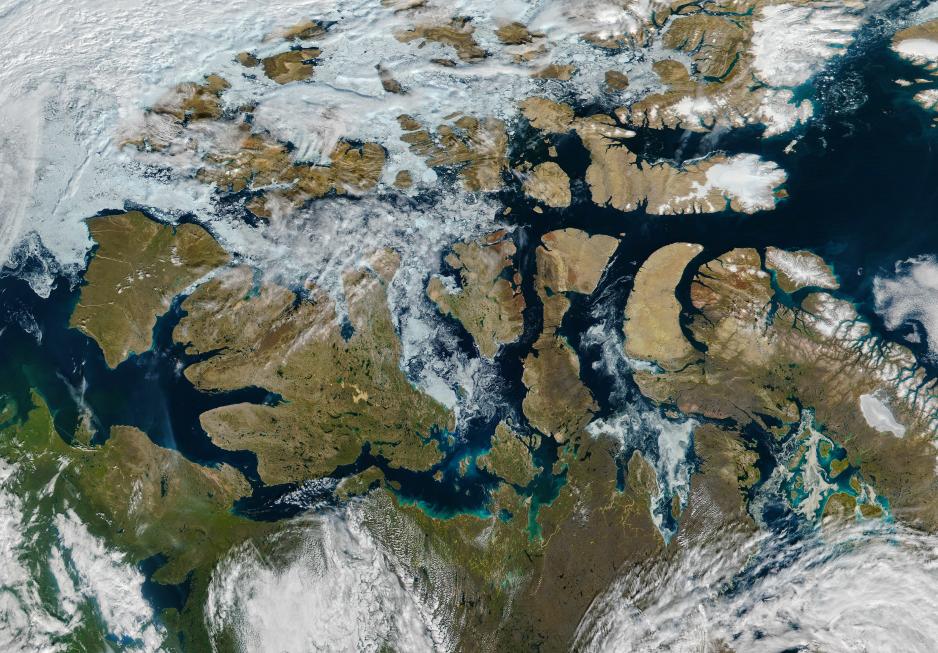Canada is pushing back at Pompeo’s assertion that Canada’s claim to the Northwest Passage is “illegitimate"

This photo depicts a nearly ice free Northwest Passage, cause in part by climate change. (Photo: NASA image by Jeff Schmaltz, LANCE/EOSDIS Rapid Response)
Pompeo’s statement about the Northwest Passage prompted the ICC to reaffirm Canada’s sovereignty over the waterway through High Arctic islands.
The Inuit Circumpolar Council–Canada is pushing back at U.S. Secretary of State Mike Pompeo’s assertion that Canada’s claim to the Northwest Passage is “illegitimate", according to Nunatsiaq News.
“The U.S. has a long-contested feud with Canada over sovereign claims through the Northwest Passage,” Pompeo told reporters May 6, the evening before the Arctic Council’s meeting in Rovaniemi, Finland, which all eight circumpolar foreign ministers attended.
Pompeo attacked both Russia and China in the same speech.
His speech came as a shock for the audience. Not because it completely lacked any reference to the climate, because Pompeo actually did talk about reducing American emissions. The shock was more due to the in part brutal verbal attacks on China and Russia and partly Canada.
Pompeo’s statement about the Northwest Passage prompted the ICC to reaffirm Canada’s sovereignty over the waterway through High Arctic islands.
Canada’s position has long been that the passage is internal and any country that wants to pass through needs permission, but, more than that, “the Northwest Passage is part of Inuit Nunangat, our Arctic homeland,” said Monica Ell-Kanayuk, president of ICC Canada, in a May 8 news release.
Conflict or not?
As High North News reported in April, there is signs that the 1988 compromise between USA and Canada over the rights to the Northwest Passage (NWP) appears to be cracking. But there are different opinions on whether to call this conflict or not. Not everyone is particularly concerned.
Heather Exner-Pirot, Managing Editor at the Arctic Yearbook and Research Associate, Observatoire de la politique et la sécurité de l'Arctique (OPSA) is one of them:
"There is a disagreement between Canada and the US over the legal status of the NWP but not what I would characterize as a conflict. It has been well managed - as you identify “an agreement to disagree” - for thirty years, and before". she told High North News.
"This view limits the understanding of the conflict. This is not a dispute over arctic resources or other causes found in the Arctic but about the geopolitical importance and the developing rivalries of the great powers. Even if a narrative developed, throughout much of the Post-Cold War era, that the Arctic is an exceptionally peaceful and cooperative region, there are clear indications that important changes threaten to destroy this exceptionalism and marking the Arctic a location of increasing tension, he says to High North News.
In his new book, he argues that a New Arctic Strategic Triangle Environment (NASTE) has major ramifications for Canada.
China pushes back
"If Washington is worried about territorial claims in the Arctic, it should turn to other Arctic Council members. And it should rest assured that no matter how Beijing defines its relationship with the Arctic, "near-Arctic" or not, it will never be a party in any Arctic territorial dispute. The Pentagon is to present a new defense strategy for the Arctic by June 1, if the past is any guide to the future it will merely continue the pattern of aggressive behavior the US has shown elsewhere, including in the South China Sea", according to an editorial from China Daily.
Zhu Feng, executive director of the Collaborative Innovation Center of South China Sea Studies and dean of the Institute of International Relations of Nanjing University, calls the statement ludicrous.
"China has been involved in the Arctic affairs on the basic principle of "mutual respect, cooperation, win-win result and sustainability". Which makes the US' claim that Sino-Russian cooperation, even in accordance with international treaties such as the UN Charter and UN Convention on the Law of the Sea, pose a threat to the Arctic region ludicrous".
U.S the spoiler
Dr Elizabeth Buchanan, a Jean Monnet Research Fellow at The Australian National University, writes in an opinion piece in Moscow Times that she thinks Russia has come out of the Ministerial Meeting as a good Arctic player and that the U.S. is now cast as the spoiler.
"Unsurprisingly perhaps, there was a stark difference between the U.S. and the Russian position on the Arctic. Whilst Pompeo delivered a doomsday sermon on the region becoming an "arena for power and for competition," Russian Foreign Minister Sergey Lavrov articulated the need for "deeper state-to-state cooperation." Russia additionally highlighted the need to use a "lens of opportunity" when considering challenges faced in the Arctic region", she writes.

